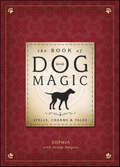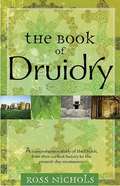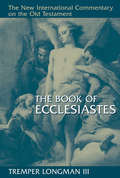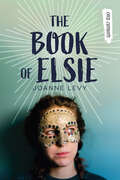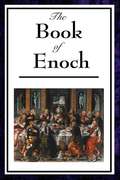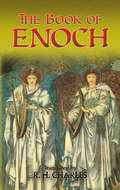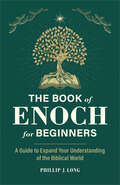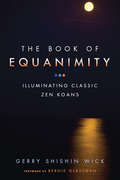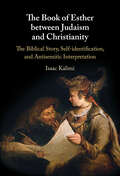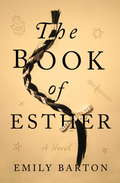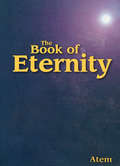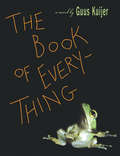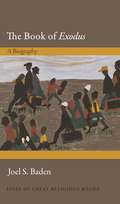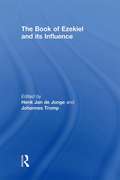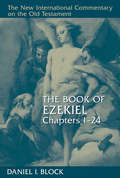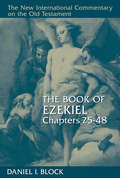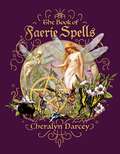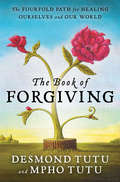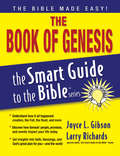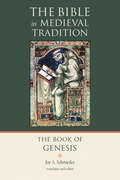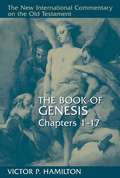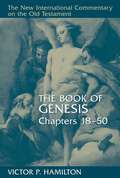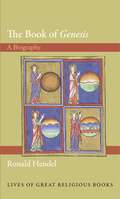- Table View
- List View
The Book of Dog Magic: Spells, Charms & Tales
by Denny Sargent SophiaEnter the realm of dog magic, where you'll develop incredible relationships with your canine friends that allow you to know what your dogs are thinking, see through their eyes, heal physically and emotionally through your spiritual bond with them, and more. Filled with stories, spells, charms, and exercises, The Book of Dog Magic shows you how to understand your pets on a deep, even psychic, level.Join authors Sophia and Denny Sargent as they explore the history, mythology, and cultural impact of canines. Discover magical techniques to teach obedience, invoke your dog totem, and connect with a dog in the afterlife. You and your furry friends will love this comprehensive, easy-to-use guide.
The Book of Druidry
by Ross NicholsA comprehensive study of the Druids, from their earliest history to the present-day renaissance.
The Book of Ecclesiastes (Qohelet) and the Path to Joyous Living
by T. A. PerryThis is the first full-length study of Ecclesiastes using methods of philosophical exegesis, specifically those of the modern French philosophers Levinas and Blanchot. T. A. Perry opens up new horizons in the philosophical understanding of the Hebrew Bible, offering a series of meditations on its general spiritual outlook. Perry breaks down Ecclesiastes' motto 'all is vanity' and returns 'vanity' to its original concrete meaning of 'breath', the breath of life. This central and forgotten teaching of Ecclesiastes leads to new areas of breath research related both to environmentalism and breath control.
The Book of Ecclesiastes (The New International Commentary on the Old Testament)
by Tremper Longman IIIEcclesiastes is one of the most fascinating -- and hauntingly familiar -- books of the Old Testament. The sentiments of the main speaker of the book, a person given the name Qohelet, sound incredibly modern. Expressing the uncertainty and anxieties of our own age, he is driven by the question, "Where can we find meaning in the world?"But while Qohelet's question resonates with readers today, his answer is shocking. "Meaningless," says Qohelet, "everything is meaningless." How does this pessimistic perspective fit into the rest of biblical revelation? In this commentary Tremper Longman III addresses this question by taking a canonical-Christocentric approach to the meaning of Ecclesiastes.Longman first provides an extensive introduction to Ecclesiastes, exploring such background matters as authorship, language, genre, structure, literary style, and the book's theological message. He argues that the author of Ecclesiastes is not Solomon, as has been traditionally thought, but a writer who adopts a Solomonic persona. In the verse-by-verse commentary that follows, Longman helps clarify the confusing, sometimes contradictory message of Ecclesiastes by showing that the book should be divided into three sections -- a prologue (1:1-11), Qohelet's autobiographical speech (1:12-12:7), and an epilogue (12:8-14) -- and that the frame narrative provided by prologue and epilogue is the key to understanding the message of the book as a whole.
The Book of Elsie (Orca Currents)
by Joanne LevyElsie Rose-Miller loves celebrating the Purim holiday and can't wait for the annual costume party at her local synagogue. Elsie plans to dress up as the fierce and smart Queen Esther, who saved all the Jewish people. But when financial hardship and a terrible incident of hate-inspired vandalism threaten not only the party but the synagogue too, Elsie, like Queen Esther, takes action to bring her entire community—Jewish and non-Jewish alike—together. This short novel is a high-interest, low-reading level book for middle-grade readers who are building reading skills, want a quick read or say they don’t like to read! The epub edition of this title is fully accessible.
The Book of Enoch
by EnochThe Book of Enoch is the most notable extant apocalyptic work outside the canonical Scriptures. It describes the fall of the Watchers, the angels who fathered the Nephilim (cf. the bene Elohim, Genesis 6: 1-2). The fallen angels went to Enoch to intercede on their behalf with God after he declared to them their doom. The remainder of the book describes Enoch's visit to Heaven in the form of a vision, and his revelations.
The Book of Enoch
by R. H. CharlesR. H. Charles provides a definitive translation of one of the most noted apocalyptic works still in existence. Often described as "the lost book" of the Bible, The Book of Enoch seems to have been written in Palestine by several different authors in the first and second centuries B.C. For hundreds of years it was accepted by the early church fathers, but it was rejected by the council of Laodicea in A.D. 364. Today, it remains a written remnant of the Apocalypse—an ardent testament to hope and the triumph of good over evil in the dawning of a world to come. Rife with concepts of original sin, fallen angels, demonology, resurrection, and the last judgment, it is a vital document to the origins of Christianity.The Book of Enoch is comprised of various monumental works: The Book of Enoch, The Parables, The Book of the Courses of the Heavenly Luminaries, The Dream Visions, The Concluding Section, and The Noah Fragments. Each work is independent, but all the works are bound by a common theme: the punishment of the wicked and the blessedness of the righteous. This edition, complete with analysis and notes, is an indispensable resource for the study and understanding of both the Old and New Testaments.
The Book of Enoch for Beginners: A Guide to Expand Your Understanding of the Biblical World
by Phillip J. LongJourney through the strange world of the Book of Enoch Fragments of the Book Enoch were found among the Dead Sea Scrolls yet were not published until 1978. Considered one of the lost books of the Bible, "1 Enoch" features unique writing on fallen angels, the great flood of Genesis, the final judgment, and the prophecy of a future messiah. Use this guide to delve into the key events and figures of the text, from The Book of Watchers to The Epistle of Enoch. An engaging introduction—Dive right in with a summary of the subject matter and key facts about the history and content. Easily digestible sections—Gain a thorough understanding of Enoch through a combination of summaries, key verses, and enlightening commentary, all designed for beginning students. Rarely covered material—Find information on the lesser-known aspects of the book of Enoch, complete with material on how all five sections can enhance our understanding of the Bible, early Christianity, and early Judaism. Demystify the Book of Enoch with The Book of Enoch for Beginners
The Book of Equanimity
by Bernie Glassman Gerry Shishin WickThe Book of Equanimity contains the first-ever complete English language commentary on one of the most beloved classic collections of Zen teaching stories (koans), making them vividly relevant to spiritual seekers and Zen students in the twenty-first century. Continually emphasizing koans as effective tools to discover and experience the deepest truths of our being, Wick brings the art of the koan to life for those who want to practice wisdom in their daily lives. The koan collection Wick explores here is highly esteemed as both literature and training material in the Zen tradition, in which koan-study is one of two paths a practitioner might take. This collection is used for training in many Zen centers in the Americas and in Europe but has never before been available with commentary from a contemporary Zen master. Wick's Book of Equanimity includes new translations of the preface, main case and verse for each koan, and modern commentaries on the koans by Wick himself.
The Book of Esther between Judaism and Christianity
by Isaac KalimiThe book of Esther is one of the most challenging books in the Hebrew Bible/Old Testament, not only because of the difficulty of understanding the book itself in its time, place, and literary contexts, but also for the long and tortuous history of interpretation it has generated in both Jewish and Christian traditions. In this volume, Isaac Kalimi addresses both issues. He situates 'traditional' literary, textual, theological, and historical-critical discussion of Esther alongside comparative Jewish and Christian interpretive histories, showing how the former serves the latter. Kalimi also demonstrates how the various interpretations of the Book of Esther have had an impact on its reception history, as well as on Jewish-Christian relations. Based on meticulous and comprehensive analysis of all available sources, Kalimi's volume fills a gap in biblical, Jewish, and Christian studies and also shows how and why the Book of Esther became one of the central books of Judaism and one of the most neglected books in Christianity.
The Book of Esther: A Novel
by Emily BartonWhat if an empire of Jewish warriors that really existed in the Middle Ages had never fallen--and was the only thing standing between Hitler and his conquest of Russia? Eastern Europe, August 1942. The Khazar kaganate, an isolated nation of Turkic warrior Jews, lies between the Pontus Euxinus (the Black Sea) and the Khazar Sea (the Caspian). It also happens to lie between a belligerent nation to the west that the Khazars call Germania--and a city the rest of the world calls Stalingrad.After years of Jewish refugees streaming across the border from Europa, fleeing the war, Germania launches its siege of Khazaria. Only Esther, the daughter of the nation's chief policy adviser, sees the ominous implications of Germania's disregard for Jewish lives. Only she realizes that this isn't just another war but an existential threat. After witnessing the enemy warplanes' first foray into sovereign Khazar territory, Esther knows she must fight for her country. But as the elder daughter in a traditional home, her urgent question is how.Before daybreak one fateful morning, she embarks on a perilous journey across the open steppe. She seeks a fabled village of Kabbalists who may hold the key to her destiny: their rumored ability to change her into a man so that she may convince her entire nation to join in the fight for its very existence against an enemy like none Khazaria has ever faced before.The Book of Esther is a profound saga of war, technology, mysticism, power, and faith. This novel--simultaneously a steampunk Joan of Arc and a genre-bending tale of a counterfactual Jewish state by a writer who invents worlds "out of Calvino or Borges" (The New Yorker)--is a stunning achievement. Reminiscent of Michael Chabon's The Yiddish Policemen's Union and Philip Roth's The Plot Against America, The Book of Esther reaffirms Barton's place as one of her generation's most gifted storytellers.
The Book of Eternity
by AtemA journey of discovery of the universe and of the self.'The Book Of Eternity' is a philosophy which is spiritual yet not religious; concise rather than verbose, and resonates with a part of us which is just beginning to awaken.A book not only to be read but to be experienced; and once experienced, never to be forgotten.
The Book of Everything: The Play
by Guus KuijerFaith is joy is love is hope in this novel of exquisite power and everyday miracles, reminiscent of Barbara Kingsolver's THE POISONWOOD BIBLE.Thomas can see things no one else can see. Tropical fish swimming in the canals. The magic of Mrs. Van Amersfoort, the Beethoven-loving witch next door. The fierce beauty of Eliza with her artificial leg. And the Lord Jesus, who tells him, "Just call me Jesus." Thomas records these visions in his "Book of Everything." They comfort him when his father beats him, when the angels weep for his mother's black eyes. And they give him the strength to finally confront his father and become what he wants to be when he grows up: "Happy."
The Book of Exodus: A Biography (Lives of Great Religious Books #48)
by Joel S. BadenAn essential biography of one of the Bible’s most powerful and inspiring booksExodus is the second book of the Hebrew Bible, but it may rank first in lasting cultural importance. It is here that the classic biblical themes of oppression and redemption, of human enslavement and divine salvation, are most dramatically expressed. Joel Baden tells the story of this influential and enduring book, tracing how its famous account of the Israelites’ journey to the promised land has been adopted and adapted for millennia, often in unexpected ways.Baden draws a distinction between the Exodus story and the book itself, which is one of the most multifaceted in the Bible, containing poems, law codes, rituals, and architectural plans. He shows how Exodus brings together an array of oral and written traditions from the ancient Middle East, and how it came to be ritualized in the Passover Seder and the Eucharist. Highlighting the remarkable resilience and flexibility of Exodus, Baden sheds light on how the bestowing of the Torah to Moses on Mount Sinai divided Jewish and Christian thinkers, on the importance of Exodus during the Reformation and the American Revolution, and on its uses in debates for and against slavery. He also traces how the defining narrative of ancient Israel helped to define Mormon social identity, the American civil rights movement, and liberation theology.Though three thousand years old, the Exodus—as history, as narrative, as metaphor, as model—continues to be vitally important for us today. Here is the essential biography of this incomparable spiritual masterpiece.
The Book of Ezekiel and its Influence
by Johannes TrompThe Book of the Old Testament prophet Ezekiel (6th century B.C.E.) is a book of forceful language and impressive images. Its message is often clear, sometimes mysterious. The book had great impact in Jewish and early Christian literature as well as in western art. This book deals with the intentions of the book of Ezekiel, but also focuses on its use by subsequent writers, editors or artists. It traces Ezekiel's influence in Jesus' teaching about the Kingdom of God, in Paul, the Gospels, and Revelation, and also shows that Ezekiel's imagery, via Jewish mysticism, influenced the visionary art of William Blake. Presenting contributions from leading biblical scholars in Oxford and Leiden, based on their unique collaborative research, this book will be of interest to a wide range of scholars working in the field of biblical studies, including those studying the Hebrew Bible, its early versions, 'inter-testamental' Judaism, New Testament and Early Christianity, and the reception of Biblical literature in later centuries.
The Book of Ezekiel, Chapters 1–24 (The\new International Commentary On The Old Testament Ser.)
by Daniel I. BlockTo most modern readers the book of Ezekiel is a mystery. Few can handle Ezekiel's relentless denunciations, his unconventional antics, his repetitive style, and his bewildering array of topics. This excellent commentary by Daniel I. Block makes sense of this obscure and often misunderstood prophet and demonstrates the relevance of Ezekiel's message for the church today.
The Book of Ezekiel, Chapters 25–48 (The\new International Commentary On The Old Testament Ser.)
by Daniel I. BlockThis work completes Daniel Block's two-volume commentary on the book of Ezekiel. The result of twelve years of studying this difficult section of Scripture, this volume, like the one on chapters 1-24, provides an excellent discussion of the background of Ezekiel and offers a verse-by-verse exposition that makes clear the message of this obscure and often misunderstood prophet. Block also shows that Ezekiel's ancient wisdom and vision are still very much needed as we enter the twenty-first century.
The Book of Faerie Spells: Southern Hemisphere
by Cheralyn DarceyThe Spiritual Guidebook is a comprehensive guide to understanding and mastering healing and psychic techniques. Tap into your intuition, your heart and soul and be amazed at how your skills unfold and develop in surprising ways. The Spiritual Guidebook includes information about opening the 3rd eye, chakras, tarot, mediumship, crystals, reiki, healing, meditation, self-hypnosis, channelling, automatic writing, auras, scrying, psychometry, energy, essential oils, yoga, Guides, shamanism, numerology, health, quantum physics, sacred geometry, self-hypnosis, mind power, spirit releasement and setting goals! This is the book to expand your psychic knowledge and intuitive healing abilities in ways you never imagined...
The Book of Forgiving: The Fourfold Path for Healing Ourselves and Our World
by Desmond Tutu Mpho TutuHow do I forgive? Nobel laureate Archbishop Desmond Tutu has witnessed some of the worst crimes people can inflict on others. So wherever he goes, he inevitably gets asked this question. This book is his answer. Writing with his daughter, Mpho, an Anglican priest, they lay out the simple but profound truths about the significance of forgiveness, how it works, why everyone needs to know how to grant it and receive it, and why granting forgiveness is the greatest gift we can give to ourselves when we have been wronged. They explain the four-step process of forgiveness--Telling the Story, Naming the Hurt, Granting Forgiveness, and Renewing or Releasing the Relationship--as well as offer meditations, exercises, and prayers to guide the reader along the way."With each act of forgiveness, whether small or great, we move toward wholeness," they write. "Forgiveness is how we bring peace to ourselves and our world."veness and granting forgiveness; and renewing or releasing the relationship. Forgiveness is hard work. Sometimes it even feels like an impossible task. But it is only through walking this fourfold path that Tutu says we can free ourselves of the endless and unyielding cycle of pain and retribution. The Book of Forgiving is both a touchstone and a tool, offering Tutu's wise advice and showing the way to experience forgiveness. Ultimately, forgiving is the only means we have to heal ourselves and our aching world.
The Book of Genesis
by Joyce GibsonUnderstand how it all happened-the fall, the flood, and more. Discover how Genesis' people, promises, and events impact your life today. Get insights into faith, blessings, and God's great plan for you-and the world.
The Book of Genesis (The Bible in Medieval Tradition (BMT))
by Joy A. SchroederRetrieves rich historical biblical insights for readers of Genesis today In this latest addition to the Bible in Medieval Tradition series, Joy Schroeder provides substantial excerpts — none previously available in English — from seven noteworthy medieval biblical interpreters who commented on Genesis between the ninth and fifteenth centuries. Representing a chronological and geographical range of authors — including Hildegard of Bingen, Nicholas of Lyra, and Denis the Carthusian — these clear, readable translations illustrate the rich diversity of medieval approaches to biblical interpretation. The commentary covers the entire book of Genesis and includes an in-depth introduction by Schroeder that locates each of the medieval authors within his or her context.
The Book of Genesis (The Bible in Medieval Tradition (BMT))
by Joy A. SchroederRetrieves rich historical biblical insights for readers of Genesis today In this latest addition to the Bible in Medieval Tradition series, Joy Schroeder provides substantial excerpts — none previously available in English — from seven noteworthy medieval biblical interpreters who commented on Genesis between the ninth and fifteenth centuries. Representing a chronological and geographical range of authors — including Hildegard of Bingen, Nicholas of Lyra, and Denis the Carthusian — these clear, readable translations illustrate the rich diversity of medieval approaches to biblical interpretation. The commentary covers the entire book of Genesis and includes an in-depth introduction by Schroeder that locates each of the medieval authors within his or her context.
The Book of Genesis, Chapters 1-17 (Genesis 1-17 Ser. #Vol. 1)
by Victor P. Hamilton“In the Old Testament we read God’s word as it was spoken to his people Israel. Today, thousands of years later, we hear in these thirty-nine books his inspired and authoritative message for us.”These twin convictions, shared by all of the contributors to The New International Commentary on the Old Testament, define the goal of this ambitious series of commentaries. For those many modern readers who find the Old Testament to be strange and foreign soil, the NICOT series serves as an authoritative guide bridging the cultural gap between today’s world and the world of ancient Israel. Each NICOT volume aims to help us hear God’s word as clearly as possible.Scholars, pastors, and serious Bible students will welcome the fresh light that this commentary series casts on ancient yet familiar biblical texts. The contributors apply their proven scholarly expertise and wide experience as teachers to illumine our understanding of the Old Testament. As gifted writers, they present the results of the best recent research in an interesting manner.Each commentary opens with an introduction to the biblical book, looking especially at questions concerning its background, authorship, date, purpose, structure, and theology. A select bibliography also points readers to resources for their own study. The author’s own translation from the original Hebrew forms the basis of the commentary proper. Verse-by-verse comments nicely balance in-depth discussions of technical matters — textual criticism, critical problems, and so on — with exposition of the biblical writer’s theology and its implications for the life of faith today.
The Book of Genesis, Chapters 18-50
by Victor P. HamiltonIn this volume, Hamilton expounds Genesis 18-50 verse by verse and provides linguistic, literary, and theological commentary of its overarching theme; Yahweh's faithfulness to his promised word and his covenant with those who were chosen to receive it. This evangelical, thorough work features a comprehensive introduction, copious footnotes, and references to the New Testament writers' interpretations of Genesis.
The Book of Genesis: A Biography (Lives of Great Religious Books #14)
by Ronald HendelAn essential biography of one of the Bible's most influential booksDuring its 2,500-year life, the book of Genesis has been the keystone to almost every important claim about reality, humanity, and God in Judaism and Christianity. And it continues to play a central role in debates about science, politics, and human rights. With clarity and skill, acclaimed biblical scholar Ronald Hendel provides a panoramic history of this iconic book, exploring its impact on Western religion, philosophy, science, politics, literature, and more.Hendel traces how Genesis has shaped views of reality, and how changing views of reality have shaped interpretations of Genesis. Literal and figurative readings have long competed with each other. Hendel tells how Luther's criticisms of traditional figurative accounts of Genesis undermined the Catholic Church; how Galileo made the radical argument that the cosmology of Genesis wasn't scientific evidence; and how Spinoza made the equally radical argument that the scientific method should be applied to Genesis itself. Indeed, Hendel shows how many high points of Western thought and art have taken the form of encounters with Genesis--from Paul and Augustine to Darwin, Emily Dickinson, and Kafka.From debates about slavery, gender, and sexuality to the struggles over creationism and evolution, Genesis has shaped our world and continues to do so today. This wide-ranging account tells the remarkable story of the life of Genesis like no other book.
